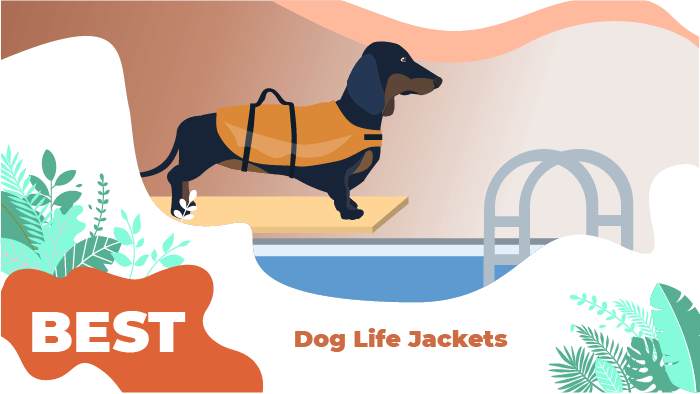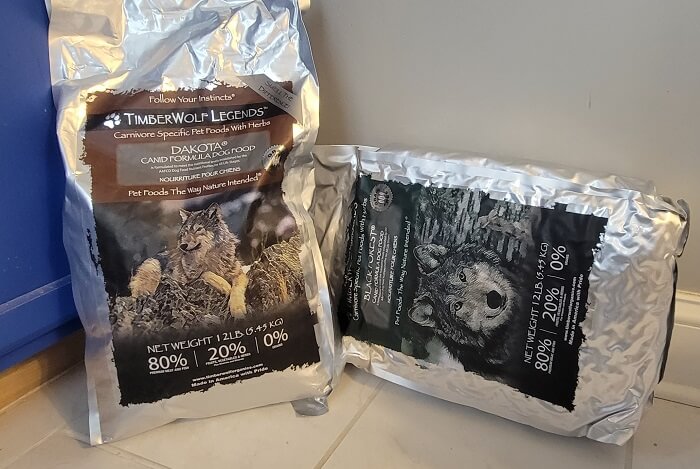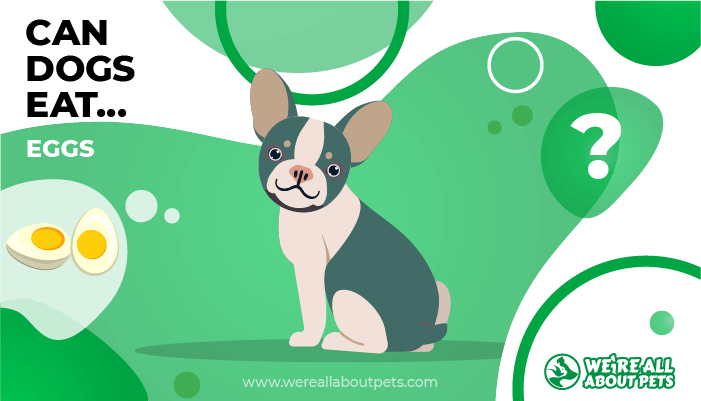Can Dogs Eat Popcorn?
This page contains affiliate links. We may earn money or products from the companies mentioned in this post through our independently chosen links, which earn us a commission. Learn More
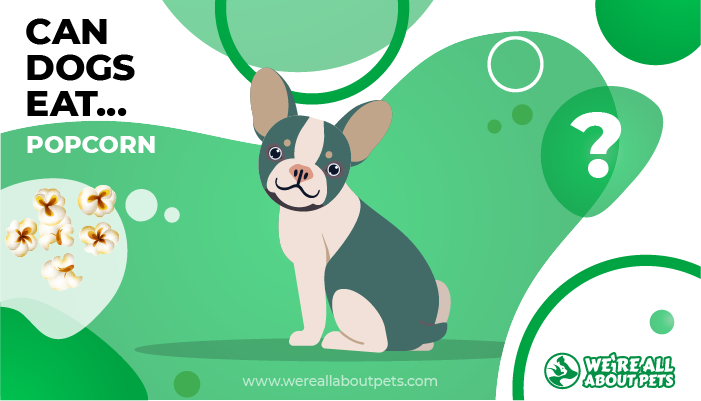
You probably realize that there are pros and cons to nearly every food, not just for humans but also for dogs. That’s true for popcorn. If you’re curious about can dogs eat popcorn, the answer is a qualified yes.
Popcorn itself isn’t bad for dogs but letting your dog eat some can depend on several factors so it’s safe.
Learn more about how you should and shouldn’t give your dog popcorn in our short guide.
Popcorn Nutrition Stats
The information provided is for air-popped white popcorn. One cup of popcorn is considered to be a serving.
- Calories: 30.6 (2% daily value)
- Protein: 1.0 g (2% daily value)
- Carbohydrates: 6.3 g (2% daily value)
- Dietary Fiber: 1.2 grams (5% daily value)
- Fat: 0.3 g (1% daily value)
- Manganese: 0.1 mg (4% daily value)
- Vitamin B6: 0.0 mg (1% daily value)
- Phosphorus: 24 mg (2% daily value)
- Copper: 0.0 mg (2% daily value)
- Sodium: 0.3 mg (0% daily value)
- Zinc: 0.3 mg (2% daily value)
- Selenium: 0.8 mcg (1% daily value)
- Thiamin: 0.0% mg (1% daily value)
- Folate: 1.8 mcg (0% daily value)
- Potassium: 24.1 mg (1% daily value)
- Calcium: 0.8 mg (0% daily value)
- Magnesium: 10.5 mg (3% daily value)
- Niacin: 0.2 mg (1% daily value)
- Riboflavin: 0.0 mg (1% daily value)
- Iron: 0.2 mg (0% daily value)
Popcorn is a variety of corn kernel which expands and puffs up when heated.
Popcorn Nutritional Facts At A Glance
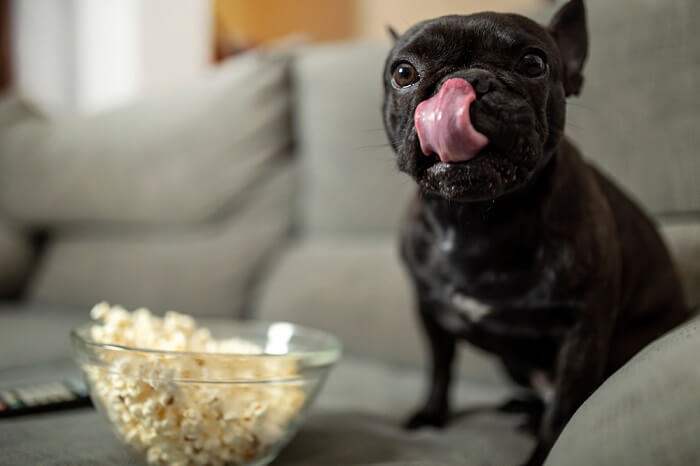
Popcorn is made from a special kind of corn kernel that “pops” when it’s heated. Each kernel has a small amount of water inside that expands when it’s heated, causing the kernel to pop.
Popcorn is considered to be a good source of dietary fiber and manganese. It contains small amounts of several minerals such as magnesium, phosphorus, zinc, and copper. It’s also low in saturated fat, cholesterol, and sodium.
Fiber, such as that found in popcorn, has been linked to weight loss and digestive health. Popcorn is low in calories, high in fiber, and provides a feeling of fullness which can help with weight loss when eaten in moderation.
Overall, it has 82 percent carbohydrates, 9 percent fat, and 9 percent protein per serving.
Popcorn is a whole grain food so it has some of the same benefits as other whole grains. Popcorn is high in antioxidants known as polyphenols.
Polyphenols are plant compounds that have been linked to health benefits such as better blood circulation, a reduced risk of some diseases, and improved digestive health. They may also help reduce the risk of some cancers, according to some studies.
However, some experts raise concerns about using the most popular kind of popcorn. That would be pre-packaged microwave popcorn. The bags of pre-packaged microwave popcorn can be lined with a chemical called perfluoroctanoic acid (PFOA).
This chemical has been associated with health problems such as thyroid issues, low birth weight, and attention-deficit/hyperactivity disorder (ADHD). The artificial butter in microwave popcorn can also contain an ingredient called diacetyl which has been associated with damage to the lungs and airways when it is breathed in, according to some studies.
Popcorn that is prepared commercially, such as products purchased at movie theaters, can be very high in trans fats, sugar, salt, and unhealthy flavorings. Popcorn is a very healthy snack but only if you eat it without the added salt, butter, and flavorings. These additions will add to the calories and cancel many of the health benefits of popcorn.
Can Dogs Eat Popcorn?
Yes, dogs can eat popcorn. Just try to eat some popcorn without sharing it with your dog!
Popcorn is a very healthy dog treat. However, if it’s loaded with butter, flavorings (artificial flavorings or otherwise), sweeteners (especially xylitol, which should never been given to dogs), or oils, it will lose most of it health benefits. It will also be loaded with calories which aren’t good for your dog.
If you want to give your dog a few pieces of popcorn, it’s best if you give him plain popcorn. Either air-popped popcorn or popcorn that has been popped on the stove in a pan or pot.
Moderation is also important. Too much popcorn isn’t good for your dog. Popcorn gives a feeling of fullness or satiety. A few pieces is more than enough.
Is Popcorn Good for Dogs?
Yes, in moderation, popcorn is good for dogs. It’s low in calories and provides good dietary fiber, along with a few minerals. But that’s only if it’s plain popcorn. If it’s loaded with butter or artificial flavorings, it loses its health benefits.
Some dog trainers like to use plain popcorn as a small reward when they train. It’s tasty, easy to make and keep in a pouch without any mess, and dogs love it.
Popcorn can be a choking hazard, though almost anything your dog eats can be a choking hazard. It’s possible for a piece of popcorn to get caught in a dog’s trachea or windpipe.
Most sources recommend that you do not let your dog eat any kernels that are only partially popped. Pick out any kernels that didn’t pop at all. Kernels can get stuck in your dog’s teeth, the same as they do with people.
This is probably annoying for your dog but it’s not a reason to avoid letting him have any popcorn. You may want to check his teeth after he eats popcorn to remove any kernels that might be stuck.
How Much Popcorn Can Dogs Eat?
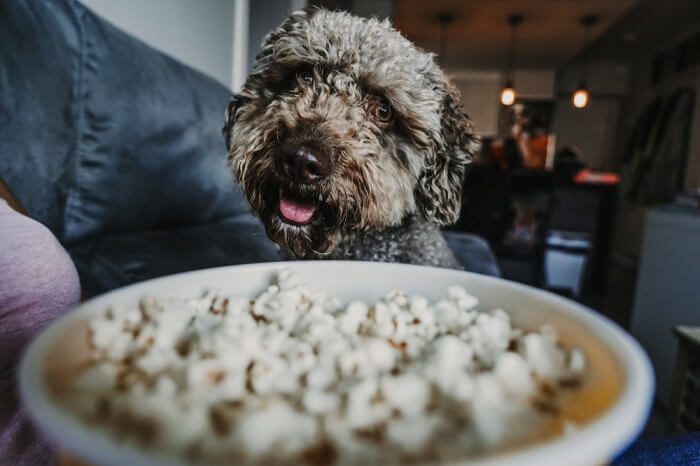
If you ask your dog, he will probably say that he can eat his share of popcorn plus yours. Don’t let him do that. It’s best to only give your dog small quantities of popcorn. Large amounts could lead to digestive tract problems such as diarrhea or vomiting, especially if your dog is not used to eating popcorn.
Even the 10 percent rule (allowing your dog to have 10 percent of his daily calories in snacks or dog treats) is probably too much when it comes to popcorn. One cup of popcorn has 30 calories.
If your 30-pound dog requires 800 calories per day, he could (theoretically) eat nearly three cups of popped popcorn using that format. That would be TOO MUCH popcorn for your dog to eat. Try to use your best judgment and don’t allow your dog to gorge himself on popcorn.
How Often Can Dogs Eat Popcorn?
Popcorn should only be given as an occasional treat. If you want to give your dog some popcorn when you make some for yourself, that should not be a problem. It’s not recommended to give your dog popcorn on a regular basis, however.
If your dog happens to eat a few kernels of your popcorn that are all buttered up and full of unhealthy flavorings, don’t panic. As long as it’s only one or two pieces, it shouldn’t be a problem.
The Correct Diet Is Important
Dogs need to eat the correct diet for good health. All dogs need good quality protein and fat appropriate for their age, lifestyle, and health condition in order to thrive.
Most healthy dogs need the following things in their diet:
- Good Sources of Protein- Meat, fish, poultry, and eggs are all good sources of animal protein. Animal protein is generally easier for dogs to digest. The more accurately the protein is identified on the label, the better.
- Good Sources of Fat- Fat provides essential fatty acids (EFA) and helps distribute the fat soluble vitamins A, D, E, and K so your dog can absorb them easily.
- Named Ingredients- Named ingredients are usually better than generic ingredients. The more specific, the better, so you know precisely what your dog is eating.
- Low to Moderate Carbohydrates- Most experts recommend diets that contain low to moderate amounts of carbohydrates. Carbohydrates are not “bad” for dogs but they should not be used as a substitute for protein. Many carbs do double duty as dietary fiber and probiotics.
- Avoid Artificial Preservatives, Colors, and Sweeteners- Artificial preservatives and colors/dyes have been linked to some health problems in humans and animals. You should try to avoid these ingredients in dog foods.
- AAFCO- AAFCO is the Association of American Feed Control Officials. AAFCO sets voluntary standards for pet food labeling. Look for foods that have these minimum standards.
- Fresh Water- All dogs need access to fresh water unless they are ill or have some other reason to be temporarily kept away from water. For example, if you are house training your puppy, you can safely put away water overnight.
If your dog has health problems of any kind, please see a veterinarian for dietary advice. Regular diets may need to be adjusted. Your dog may not be able to eat some fruits and vegetables so ask your vet.
What Are Other Healthy Alternatives to Popcorn In A Dog’s Diet?

Popcorn can be a good occasional dog treat for your dog but there are many other healthy foods you can give your dog in small amounts.
You should consider these human foods as healthy snacks. Check with your veterinarian if your dog has any health issues and you are concerned about giving any of these foods.
Remember that not all parts of a fruit or vegetable are safe for dogs in some cases.
- Apples
- Asparagus
- Avocados
- Bananas
- Bell pepper
- Broccoli
- Brussels sprouts
- Carrots
- Cauliflower
- Cucumbers
- Green beans
- Mangos
- Oranges
- Parsnip
- Pears
- Pineapple
- Pumpkin
- Strawberries
- Summer squash
- Sweet potato
- Tomatoes
- Watermelon
- Zucchini
How Do You Give Your Dog Popcorn?
Most people share a few pieces of popcorn with their dog when they happen to be eating some, such as when they are watching television. The popcorn might be on the sofa or in the floor. You could also pop some popcorn for your dog and put it in his feed dish.
Remember not to give your dog too much popcorn at one time or he could have gastrointestinal problems.
Conclusion
Plain popcorn is a healthy snack for dogs. It’s only when it’s loaded with salt, sugar, butter, oils, and flavorings (artificial and otherwise), that it becomes unhealthy.
You can let your dog enjoy a small amount of popcorn as long as it’s plain. Otherwise your dog could have gastrointestinal troubles.






